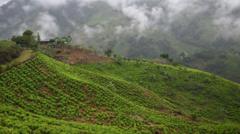The Colombian military has reported the abduction of 57 soldiers in Micay Canyon, a critical location for cocaine production. The kidnappings, attributed to pressure from dissident rebel groups, highlight the ongoing conflict and struggle for control over drug trade in the area. Negotiations for the soldiers' release are currently underway while the local population remains heavily reliant on coca cultivation.
Tensions Rise in Colombia as 57 Soldiers are Abducted by Local Civilians

Tensions Rise in Colombia as 57 Soldiers are Abducted by Local Civilians
Civilian unrest linked to rebel activities leads to the kidnapping of military personnel in Micay Canyon, amid ongoing challenges in the region's cocaine trade.
The Colombian military is currently dealing with a significant crisis in the mountainous region of Micay Canyon, where reports have emerged that 57 of its soldiers have been taken hostage by local civilians. This situation escalated over the weekend, with 31 soldiers kidnapped on Saturday and an additional group captured on Sunday when they became surrounded by over 200 individuals. Brigadier General Federico Alberto Mejía confirmed the details in a video message, labelling the incident as outright kidnapping.
Local media suggest that this action stems from the influence of the dissident group EMC, which is the largest offshoot of the formerly active Farc rebel group. Following a peace agreement made with the Colombian government in 2016, the Farc has fractured into various factions, leading to a resurgence of violence and territorial disputes in drug-producing regions.
General Erik Rodríguez indicated that the kidnappings were initiated after the military attempted to airlift a suspected EMC member from the area. Tensions heightened as their operation was met with a large local crowd that eventually seized the soldiers. Currently, negotiations are ongoing to secure their release, with all captured troops reported to be held together at a single location.
The Micay Canyon is notorious for its role in the cocaine trade, serving as a conduit for traffickers transporting drugs to Pacific ports before smuggling them globally. With the reality that over 90% of local residents rely on coca cultivation for their livelihood, General Rodríguez reiterated that the military presence represented a direct threat to this flourishing illegal economy.
The ongoing conflict has seen the Colombian government, led by leftist President Gustavo Petro, attempt to negotiate peace with the EMC. However, these discussions were jeopardized when the group's leader, Iván Mordisco, exited negotiations last year, leading to further divisions and violence among dissident factions. In the past few weeks alone, targeted attacks on security forces have left 27 soldiers dead, underscoring the precarious security situation in the region.




















